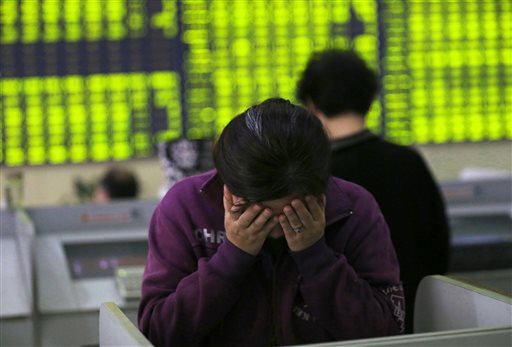China growth slows to 6.9% in second quarter—AFP survey

A woman rubs her face as she stands at a computer terminal in a stock brokerage house in Nantong in eastern China’s Jiangsu province Wednesday, July 8, 2015. China’s Shanghai Composite Index fell 5.9 percent on Wednesday. AP
BEIJING, China – China’s GDP growth likely slowed further in the second quarter, an AFP survey has found, as a slowdown in investment and trade weighed on the world’s second-largest economy.
The median forecast in a poll of 14 economists indicates gross domestic product (GDP) expanded 6.9 percent in April-June, marginally down from 7.0 percent in the first three months of this year.
That would be the worst quarterly result since the first three months of 2009, in the depths of the global financial crisis, when China’s economy expanded by 6.6 percent.
The National Bureau of Statistics (NBS) will release the official GDP figures for the first quarter of 2015 on Wednesday.
China’s volatile stock markets have grabbed headlines this month after the benchmark Shanghai Composite Index fell more than 30 percent in less than four weeks, before reversing course in the last two trading days.
But economists are focused on more fundamental issues when assessing its overall health.
“According to the figures we have now, economic activities remained very sluggish, particularly fixed-asset investment, which grew 11.4 percent in May, a multi-year low,” Liu Li-Gang, Hong Kong-based ANZ economist, told AFP of the second-quarter performance.
“Exports were weak and imports were even more so.”
‘Big downward pressure’
Chinese authorities want investment to slow as part of their plan to diversify economic growth away from big-ticket projects to increasingly wealthy consumers. But too fast a deceleration can be harmful.
“The economy is still under quite big downward pressure,” said Li Ruoyu, an analyst at the State Information Centre, a government think-tank in Beijing, also citing weak investment.
New restrictions on local government debt and finance vehicles have limited lower-level authorities’ ability to fund infrastructure projects, she said.
“The implicit guarantees of the local governments are gone, hurting their borrowing abilities.”
The stock market turmoil could also create new risks in China’s financial system, which faces numerous other challenges such as high corporate debt and an opaque “shadow banking” sector.
But the swings in equities are largely seen as having little effect on the real economy — a key driver of global growth — and unlikely to prove a major detriment to private spending.
“Given that the stock market didn’t provide any noticeable boost to spending on the way up, there is no reason to expect it to be a drag on the way down,” Julian Evans-Pritchard, China economist at Capital Economics, wrote in a report.
“With only a small and relatively wealthy portion of Chinese households exposed to the stock market, we aren’t particularly concerned about the impact of recent big falls in equity prices on consumption.”
Rate cuts
For this year as a whole, the AFP survey predicts growth at a median 7.0 percent, more optimistic than a forecast of 6.8 percent in a similar poll in April and in line with the government’s official target of “about 7.0 percent”.
China last year recorded its slowest annual growth since 1990, expanding 7.4 percent, down from 7.7 percent in 2013.
The International Monetary Fund lowered its 2015 global economic growth forecast on Thursday, citing a quarterly contraction early this year in the United States, the world’s biggest economy.
But the Washington-based institution left its forecasts for the Eurozone and China intact, brushing off worries over the crisis in Greece and Shanghai share volatility.
“The puncture of what had clearly become a stock market bubble may have some limited effect on spending,” the IMF’s chief economist Olivier Blanchard said Thursday.
“There is no particular reason to have lost confidence” in China’s economy, he added. The IMF sees China’s GDP growing at 6.8 percent this year.
Economists see positive effects to come from authorities’ efforts to put a floor on the slowdown.
The People’s Bank of China, the central bank, has cut benchmark interest rates four times since November and also took steps to encourage banks to make more loans. Such measures can take time before growth reacts.
Sheng Laiyun, spokesman for the NBS, said in comments on its website that the economy had “shown signs of a recovery” as the stimulus kicks in.
He added that property investment, an area that has been a drag on growth, is expected to turn around on rebounding market demand.
China’s new home prices increased in June for the second straight month, a private survey showed. In addition to rate cuts, authorities have taken steps to boost the property market, easing mortgage policies such as lowering minimum down payment levels on second homes nationwide.














